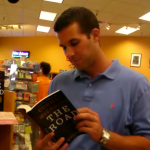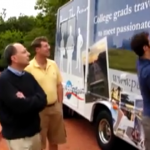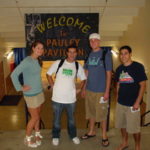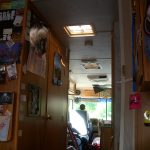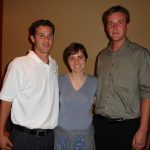Laura Dombrowski has a degree in statistics and a career in photography, thanks to the traces liberal arts found, within the general education system, at most American universities. Laura took her first photography class during her junior year of college, and spent an entire Semester at Sea traveling the world, taking pictures. She has not looked back since.
Currently a wedding photographer in Denver, Laura has found the balance for which so many self-employed people search. She constantly juggles her creative, marketing, and public relations role, allowing her to do what she loves most: tell stories through photography.
Laura started working freelance directly out of art school, and has therefore learned equally from success and failure. As a woman, in what she calls “an extremely technical industry,” her confidence is as vital, if not more so, than her talent. She advises that swallowing pride better allows rational decisions that will benefit the business; running for notoriety has a high price, and often an abstract reward.
By focusing on one field, weddings, Laura has been able to hone her skill while intensively studying her craft. The work has paid off. Her photographs have been published in various magazines, and her name is respected in the Museum Art District of downtown Denver. “Just maintain focus,” Laura urges, “And everything else will fall into place.”
Interview
Telling stories about life with images. That’s what I do.
Photography has been very hard to get everything started. The business part mainly. The most challenging part is balancing the creative side. You have to survive. When I was first starting out it was figuring out how much for a wedding shoot and how expensive it is. But it’s not that expensive because you have to look at your month long expenses. That’s always in the back of your head. That’s just hard to juggle the creative person, the marketing person, the PR person, and the business side of it. And you have to wear all the hats.
I started the business at the age of 23. People didn’t take me seriously. And I had a complex about it too. It’s a very technical field. In the very beginning I was really shooting more commercial photography because that’s what I learned in art school. It was too hard. And I look young. How was I going to convince people that I could do this?
And you know what, you have to show them your work and be extremely confident in an extremely competitive industry. It worked out. I remember those first meetings that I had with ad agencies or wedding clients, I’d get all dressed up and look the most professional I possibly could for a photographer. But that’s not me, so now it’s more me.
I’ve learned that I doubled my prices in my wedding photography. I was scared to death. I remember the first meeting I had. I’m the worst sales person ever. I don’t even want to talk about money. I just want to talk about photographs in weddings. But I thought no one was going to go for. Why would anyone pay me that much money?
And, they went for the middle package. I was like, ‘Oh my gosh. That was the coolest thing ever. I can’t believe they went for it.’ Looking back, it’s like you have to get to a point in your career where they’re booking you and not booking your package. They want you specifically, as opposed to wanting you because you’re cheap. That’s what’s changed in the last two years.
I would have never jumped that high in price. I just thought one day that I was going to go for it and see what happens. There’s definitely a difference. They respect you more and what not. At the wedding everyone treats you good. Also, you’re getting people that value photography too. It’s not like I have to get a corporate head shot done and I’m at the top of the yellow pages. These are people who want the best and want a specific feel to their photograph. Really particular.
I’ll be shooting weddings with a big camera. They’ll always be one guy at every wedding, like Uncle Bob who wants to sit there and talk to you. Which is always interesting.
I have some people who want to assist me and they think they’re doing it for money. You can’t do it for money. Because you can tell in the images that they get lazy. And you’re not really picking up the details in the stories. You’re not going to catch certain moments because you’re not into it. So passion is extremely important.
This isn’t for everybody. You have to have passion. Weddings are exhausting. You’re shooting sometimes ten to twelve hour days. It’s exhausting, but it’s so much fun.
My job is capturing images that tell a story. That’s how I approach a wedding. I tell their story. It’s that challenge of finding that one image that captures their personality and the feel of the day and what not.
You can’t dictate it. It’s how the day unfolds. They don’t know if the dad is going to cry when they’re walking down the aisle. I hope it happens every time though! I’m like, ‘Give me a tear.’ But you don’t know that.
Other certain things like I shot one outside a week ago and this huge gust of wind came and her veil flew up and she was cracking up. It was such a funny moment. I think the groom was trying to catch it. Those mistakes make it fun. It makes their day unique and what not. You can’t dictate it.
I try to be a fly on the wall. I can’t cross that line almost. Sometimes it’s hard. Of course you talk to the Uncle Bob, but you keep it brief because you’re there to shoot. I always bring an assistant, so sometimes I’m like, ‘Hey Melissa! Meet Bob!’ Then I go shoot. Or I hand Bob my card and let him know I’d be happy to answer questions by email because I have to get to work.
I was in a circumstance where I had one big client and I had to get a studio or else I couldn’t shoot for her. It was a talent agent in town and I had to do it unless I wanted to lose it. So instead of being scared and worried about what was going to happen two years down the road, I just dove in and figured it out week by week. It was always ongoing.
I wish I would have taken more risks. I felt like I was pretty doing what I was doing. Everyone was already saying ‘I can’t believe you’re doing this. You’re so young.’ I wish I would have ignored all those people. I think I could have been here a year and a half ago if I took more risks. But that is scary for me.
I’d make money on one shoot and buy the next lens. I’d make money on another shoot and buy another backdrop. I was extremely good with money, which I think was smart, but I just wish I would have taken a little bit more risk and having more confidence in myself that I would get that money back. I wouldn’t have been as scared to do more advertising and get more high end clients earlier.
I have had to put some friends at a pretty far distance because they were bringing me down. Jealousy is a big thing when you’re doing this type of thing because it’s weird. They think you don’t do anything all day and that you have all this freedom. I’ve heard comments like, ‘It must be nice not to have a job.’ I’m like, ‘Whoa, whoa. I just worked seven days in a row nonstop. It’s okay if I go up to the mountains for a Monday and Tuesday.’
But I heard a lot of that and it was extremely discouraging. Another hard thing is that all the friends I had were working in the corporate world right out of the school. They would go away during the weekends and I couldn’t because I had a shoot every weekend. That’s extremely hard. You feel alone in this world. All you know is corporate America and it’s kind of sad.
One piece of advice is surround yourself with creative people. The space where I’m working right now, this studio, this floor is all artists. They’re all working for themselves. They’re the only ones in their businesses. They don’t have help. This has been a blessing to be here and be surrounded by people who are like me. Then I don’t feel so crazy. I feel normal here.
You can be the best photographer or artist in the world, and if no one sees it, does it matter?
The goal is to keep going. I’ve never had any money goals where I want to make a certain amount of money. That’s silly. I’m sure everyone you’ve interviewed hasn’t been motivated by money.
There’s certain magazines I’d like to be published in. There’s a lot of awards and photography contests and stuff like that.
Two or three years ago I wanted to be in a gallery. I did it. And it was the worst business idea I’ve ever had in my life. By the time you get your work framed, and the time it takes to shoot it, it’s months and months that you’re putting into this one shoot. Framing is extremely expensive if you do it well. And then you sell two pieces and kind of broke even but not really because you spent a month doing it. Horrible idea! I never did it again.
That’s the thing with running a business you’re passionate about. Sometimes you want to do stuff for pride. That’s something I did definitely to be cool and be in a gallery. But it’s just a bad business idea. You’re not going to make any money on it. Swallow your pride a little bit. I show my work here and that’s fine for me.
I’ve learned that you have to focus on one thing. For the first year I was the advertising photographer, I was the fine art photographer, I was the wedding photographer, I was a portrait photographer…I did everything. And it said ‘Available for hire!’ on my website. I did not specialize in one thing. I finally figured out that you have to become an expert in one field. Well, photography isn’t just one field. It’s many little fields of expertise.
So I shot a couple of weddings and I ended up falling in love with it. It was exactly what I wanted to do. It was a great combination of photojournalism. I still get to do a little fashion and fine art in that one day. I chose to pursue that and push it as hard as I could.
Every day you’re addressed with decisions. You have to make these little decisions each day and week and if you focus on that one goal, if you have that one goal in mind, everything else will just be extra. Then, it makes every decision really easy. ‘Is this going to help me as a wedding photographer?’ I wish someone would have told me to focus in the very beginning.
I thought there was a stereotype of wedding photographers. The creepy long haired guy with the ponytail. Or the hopeless romantic that just wants her own wedding. A year ago I went to a conference in LA for wedding photographers. There’s probably 400 people in this room who are all wedding photographers. The coolest, hippest people you have ever seen. I had no idea this industry was cool and hip.
This job actually kind of turns you off from weddings. I’m not married. But it takes some of the mystic away when you’re doing it all the time. I’m scared that if I ever get married, that I won’t care. It kind of desensitizes you because you see it all the time. So I’m not obsessed with getting married. I get excited when my friends get married. I tell them all the details of what they should and shouldn’t do. I like helping them plan a bit.
I never get nervous for a shoot. But weddings are different because it’s one day. But I’ve learned the system and I bring a laptop and a second hard drive. I’m backing up like you wouldn’t believe. That’s why I bring an assistant and that’s what she does a lot. She just backs up. That’s why I would get nervous. If I lost something.

